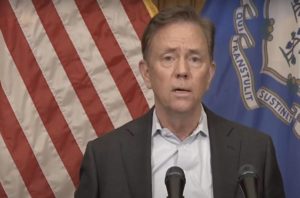Gov. Ned Lamont has extended the regulations included in his Covid-19 executive orders to April 20 ”“ a move to which state Republican leaders are objecting.

By signing a declaration this morning that extends Connecticut”™s state of emergency in response to the ongoing COVID-19 pandemic ”“ which applies to both the civil preparedness emergency and the public health emergency ”“ the state will be afforded more time to determine a clearer picture than it does now of its vaccination strategy.
“The people of Connecticut are to be commended for their actions to prevent the further spread of this virus, and I truly believe that the steps they”™ve taken have made an impact,” Lamont remarked. “That said, the virus is not going to suddenly end on Feb. 9, and to eliminate all of these preventative measures on that day would be irresponsible and in many cases life-threatening.
“Our administration remains committed to working in collaboration with the legislature on these emergency orders as we”™ve done throughout this pandemic so that we can provide the best protocols needed to protect the residents of our state,” he added.
The extension will keep in place a 9:30 p.m. curfew for businesses, with restaurants still restricted to 50% indoor capacity.
In neighboring Massachusetts, the 9:30 p.m. curfew is being lifted on Feb. 1, in the face of a decline in Covid cases. “Those trends are moving in the right direction,” Gov. Charlie Baker said. “As a result, we believe it”™s okay and it”™s time to start gradually easing on the restrictions we put in place.”
Meanwhile, Republican leaders have expressed their opposition to the extension, with House Minority Leader Vincent Candelora (R-North Branford) and Senate Minority Leader Kevin Kelly (R-Stratford) issuing a letter to fellow lawmakers proposing legislation that would limit public emergencies to 30 days, subject to approval by a majority vote of the General Assembly.
“Unfortunately, in our view, the continued exercise of emergency powers has become a matter of convenience, rather than a matter of emergency,” they wrote. “We hope you”™ll join us in seeking a path toward replacing the overly-broad control held by the executive branch with a more collaborative decision-making process that gives equal footing to legislators and the citizens we were elected to serve.”
In response, House Speaker Matt Ritter (D-Hartford) and Senate President Pro Tem Martin Looney (D-New Haven) issued a statement accusing the GOP of “underplaying the seriousness of the crisis and the administrative challenges of distributing the vaccines while we are dealing with ongoing consequences of the ineptitude and inadequate planning of the previous Republican national administration.”
“We very much consider the Covid-19 pandemic to be a continuing emergency, not a mere inconvenience,” they wrote.
According to the latest data from the Connecticut Department of Public Health, as of 5 p.m. Monday the state”™s daily positivity rate stood at 4.73%. There have been over 5.5 million tests conducted, which have netted 243,632 positive results. There are 1,068 residents hospitalized with Covid-related symptoms ”“ including 258 in Fairfield County ”“ and there have been 6,911 deaths.
In addition, the governor announced that another four individuals have been diagnosed with the Covid-19 variant B.1.1.7, commonly known as the U.K. variant. That brings the total number of confirmed cases of the variant in Connecticut to eight: Two in New Haven, three in Oxford, and three in West Haven. They range in age from 15 to 50.
“This new strain, which is considered to be more easily transmitted, is spreading quickly throughout the world, and it”™s highly likely that these are not the only eight cases in Connecticut. That is why it is so important that everyone continues taking precautions to prevent transmission of this disease,” Lamont said. “The health of Connecticut residents remains our top priority, and our public health officials will continue to closely monitor these cases and any other developments with this contagious virus.”
















